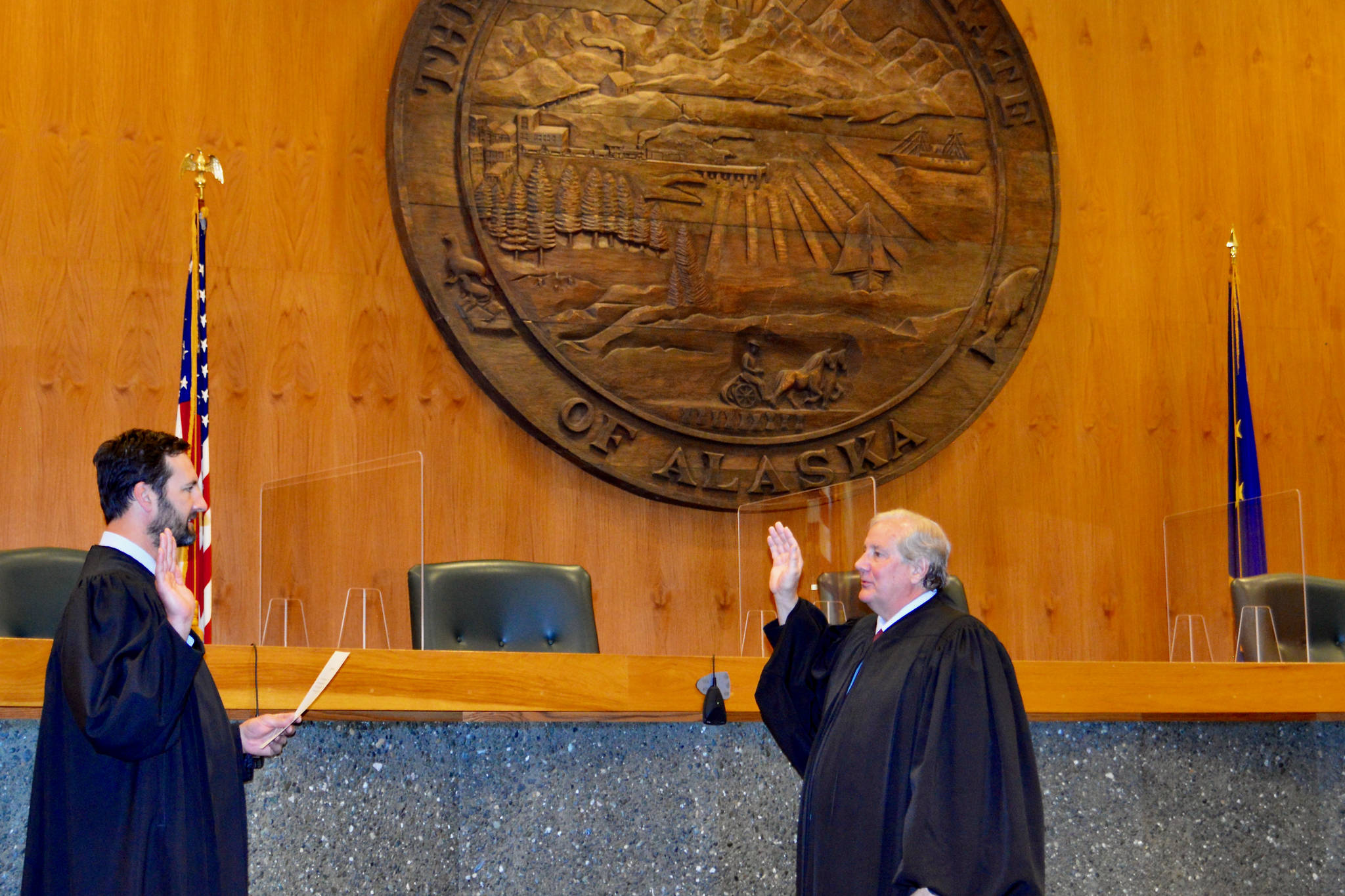This article has been updated to include a response from the governor’s office and reflect an appointmet.
The Alaska Supreme court selected a new chief justice earlier this month, following the retirement of former Chief Justice Joel Bolger.
Chief Justice Daniel E. Winfree of Fairbanks was sworn in on July 1, by Justice Dario Borghesan, the Alaska Court System said in a news release. Winfree is the first chief justice to be born in Alaska, according to the court system, and the second chief justice from Fairbanks.
The chief justice serves a three-year term as the administrative head of the judicial branch of government, presides over Alaska Supreme Court arguments and conferences, appoints presiding judges for all judicial districts and serves as the chair of the Alaska Judicial Council. Under Alaska’s Constitution, the chief justice is selected from among the justices by majority vote.
Born in 1953 the Alaska Territory in Fairbanks, Winfree is the grandson of turn-of-the-century Yukon and Alaska gold rushers, according to the court system. From 1975 to 1978 he was a truck driver and warehouseman in pipeline construction camps and at Prudhoe Bay, working on the Trans-Alaska Pipeline.
Winfree earned a degree in finance from the University of Oregon in 1977, and in 1981, earned an MBA and JD from the University of California Berkeley.
[Lawmakers announce PFD working group]
He was admitted to the Alaska Bar in 1982, he spent 25 years in private practice in Anchorage, Valdez and Fairbanks, working with large firms, small firms, and as a sole practitioner on matters across the state, the release said.
Winfree served nine years on the Alaska Bar Association Board of Governors and was its President from 1994-1995. He also served a term on the Bar Association’s Ethics Committee and several terms on its Fee Arbitration Committee. The Bar Association presented him its Distinguished Service Award in 2007. After his final term on the Board of Governors, he joined the Board of Trustees of the Alaska Bar Foundation and served as its president for two years. He now chairs the Supreme Court’s Code of Judicial Conduct Rules Committee and Appellate Rules Committee.
Justice Winfree is married to another Fairbanks-born, third-generation Alaskan, Cathleen Ringstad Winfree. They have two children.
Governor announces appointment
Wednesday evening, Gov. Mike Dunleavy announced the appointment of Judge Jennifer Stuart Henderson to the high court.
The appointment follows a previous request by Dunleavy for additional nominees and comes ahead of a looming July 11 deadline to appoint someone to the state Supreme Court.
In a July 1 letter, Dunleavy asked the council to provide additional names for selection, specifically naming Judge Paul Roetman as being overlooked by the council.
Dunleavy lauded Roetman’s career, saying he had more time serving as a judge than any individual of the nominated individuals.
“No one path leads to a perfect judge,” Dunleavy wrote in his letter to the council. “The people of Alaska, including myself, wonder how someone like Judge Roetman is qualified to sit where he currently is but not have his name put forward for consideration to the Alaska Supreme Court?”
Under the state Constitution, Alaska’s judges are chosen by the Judicial Council whose members must also be members of the Alaska Bar Association. Speaking to the Empire on July 1, Judicial Council Executive Director Susanne Dipietro said the council’s bylaws don’t allow for additional nominees to be put forward except for in extreme cases such as a sudden death.
Dipietro said the council had a thorough vetting process which was clearly laid out in the state constitution and the council’s bylaws.
“Since statehood, the council has had the procedure of screening candidates on merit,” Dipietro said. “It’s a process that looks at the qualities of all the applicants among a list of extremely accomplished individuals, grounded in the bylaws.”
Henderson has resided in Alaska for 18 years, according to the governor’s office, and has practiced law for 18 years. She graduated from Yale Law School in 2001 and is a superior court judge in Anchorage.
In 2019, Dunleavy appointed a judge after the deadline, and a recall-focused group has cited the failure to make a timely appointment as one of the reasons for removing the governor.
• Contact reporter Peter Segall at psegall@juneauempire.com. Follow him on Twitter at @SegallJnuEmpire.

